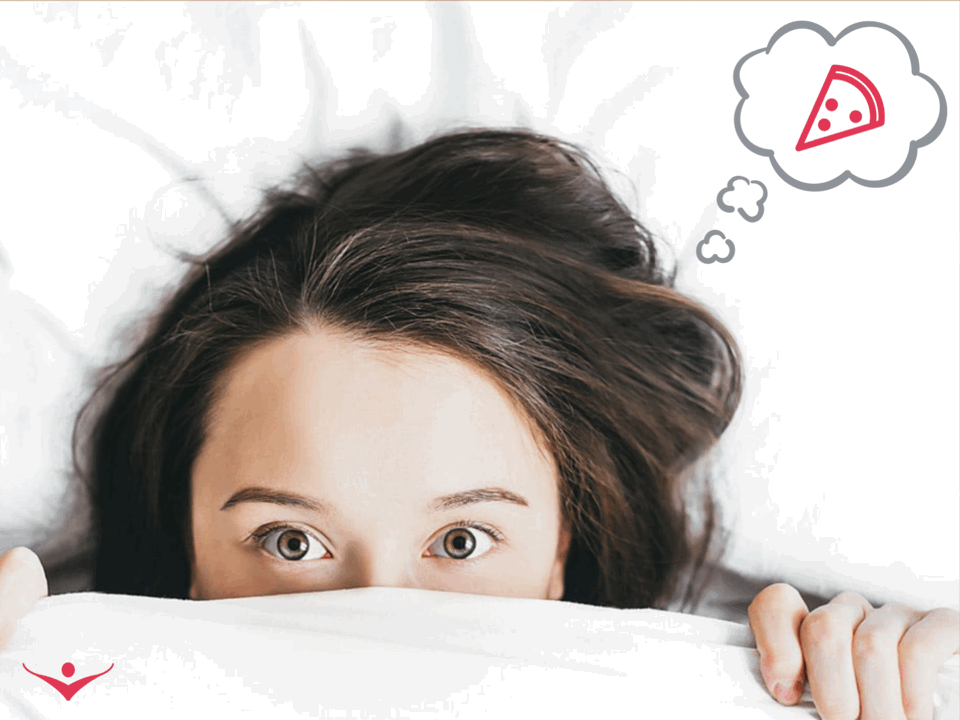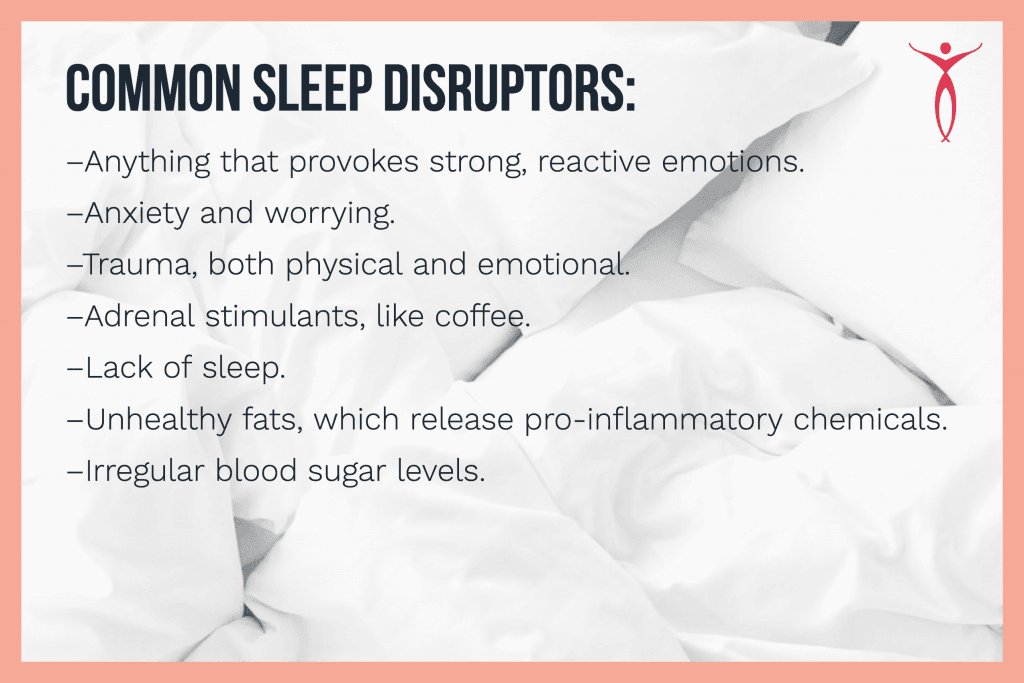
Real talk: Does eating before bed affect your sleep?
It’s 9:30 p.m., and your stomach starts rumbling again. Now you have a decision to make: suppress your appetite and hit the hay or sneak down the hallway for a bedtime snack.
To practice good sleep hygiene, eat your last meal around (or right after) nightfall. Consult our popular Body Ecology Diet book to learn more about how to plan meals that work for your gut — and your body.
We’ve all been there when the late-night cravings hit. So, what’s the verdict on eating before bed? Is late-night snacking healthy for you? Unfortunately, it’s not.
Bottom line: Eating during bedtime hours — whether it’s a large dinner or a small snack while watching your favorite TV show — may seem to help you fall asleep. But it could actually harm your overall health and metabolism, creating added stress inside your body.1
Let’s take a closer look at the basics.
What are the factors that impact sleep?
During the dark hours of the night, a hormone called norepinephrine is released. It tells the brain to make melatonin. Think of melatonin as the chemical that dominates sleep cycles. When your blood sugar crashes in the middle of the night (as the result of late-night eating), cortisol levels rise, and melatonin production diminishes — thus, interrupting a good night’s sleep.
Eating before bed may cause your blood sugar to spike and crash before you even wake up. New research ties a late meal to up to 18-percent higher blood sugar.2 This blood sugar crash may potentially put stress on your body, weaken your digestive system, and contribute to adrenal dysfunction.

Poor sleep may also alter the immune system’s stress response — increasing the risk of mental and physical health problems by increasing inflammation in the body, as seen in a study conducted on older adults.3 And unsurprising to many of us, researchers likewise confirmed a reciprocal, causal relationship between job stress and poor sleep, showing that daytime stress can impact sleep quality and create a stress-sleep disturbance cycle that is hard to break.4
That’s where a natural sleep aid can come in to help supply your body with the “restful” chemicals it needs, specifically, the two “Ms” — magnesium and melatonin. While most of us are familiar with taking melatonin to improve sleep, the most underrated sleep remedy is magnesium.
Try it now: Body Ecology Ancient Earth Minerals.
Beware of the late-night blood sugar crash.
Eating late at night may initially raise your blood sugar. While sleeping, your body goes into a light fast. If you eat before sleeping, you may be more likely to experience a crash in blood sugar while asleep.
What happens during a blood sugar crash?
- Your blood sugar spikes, triggering pancreas cells to release insulin into your bloodstream.
- If the blood sugar spike happens frequently (as it does for many of us), the pancreas delivers too much insulin into the bloodstream, causing a drastic drop in blood sugar, or a “crash.”
- A blood sugar crash alerts the adrenals that there’s an emergency, so your body secretes the stress hormone cortisol.
- Frequent cortisol releases like these may potentially exhaust adrenal function, inflame the body, and weaken your digestive system.
Skipping meals or regularly eating foods that are starchy or sugary may cause blood sugar spikes, and both may lead to the same thing: adrenal dysfunction. What’s interesting is that people who skip meals will often use adrenal stimulants or excessively sugary foods to get a quick lift of energy.
This blood sugar yo-yo effect in the body will pull on the adrenal glands for cortisol. This pulling on the adrenal glands does something else in the body. Eventually, it will exhaust other elements of the endocrine system. The endocrine system is the system in charge of regulating hormones.
Studies even suggest that eating less late at night may buffer some of the effects of sleep deprivation, like deficits in alertness and concentration.5 Eating at least two hours before bed might also help lower your risk of breast or prostate cancer.6
Newsflash: Melatonin is not the answer.
Many people assume that melatonin is the key to restoring the body’s natural circadian rhythm.
However:
- Supplementing with melatonin is not recommended.
- Short-term, emergency use may be tolerated.
- But keep in mind that, ultimately, you want your body to remember its own natural ebb and flow of hormones.
Melatonin is a hormone, and giving your body this hormone over time may actually lead to a deeper and more pathological imbalance.
Researchers have cautioned that melatonin can be dangerous for children especially, warning doctors and parents not to give kids melatonin to help manage sleep issues.7 For adults, caffeine has also been proven to alter our circadian clock — delaying internal rhythms up to 40 minutes after drinking a double espresso before bed.8
Can more magnesium promote deeper sleep?
In addition to calming your nervous system down, magnesium helps with maintaining GABA levels, a neurotransmitter responsible for turning off the “wakefulness” that prevents you from falling asleep. As a bonus, the mineral can also help increase your body’s dopamine supply, leading to a potential boost in mood (AKA happier you).9
Some people can do well with magnesium supplementation. Magnesium does have a laxative effect, so keep this in mind if you decide to use it as a sleep aid. A full-spectrum mineral supplement, like Body Ecology Ancient Earth Minerals, is another good way to not only help support levels of magnesium but to also help bring your body fully into mineral balance.
Along with its ability to promote relaxation and help reduce anxiety, magnesium has been dubbed a vital sleep nutrient because it keeps the “trains running on time.” Researchers have discovered that magnesium plays a critical role in helping living things adapt to the natural rhythms of night and day.10
Bottom line: Eating late at night may increase your blood sugar, causing a rise in cortisol levels and a sugar crash while you’re asleep. Whether you know it or not, this vicious cycle could lead to adrenal dysfunction — which may contribute to digestive issues, poor immunity, inflamed skin, and sleep deprivation.
Try these quick tips to improve your sleep (and quality of life):
- Avoid stress to combat cortisol, which is the number one enemy of restful sleep.
- Make your last meal of the day around or shortly after nightfall.
- Opt for a balanced dinner with lots of water throughout the day.
And, think about supplementing with a full-spectrum and magnesium-rich mineral supplement, like Body Ecology Ancient Earth Minerals, to help alkalize your body, dampen the inflammatory cascade, and support more restful sleep.11,12
REFERENCES:
- 1. Powell ED, Albers J, Andry S, Greenlund E, Ojile JM. Does habitual stress cause sleep problems and daytime functioning impairments, or is stress the result of poor sleep? SLEEP. June, 2009; 8;32(suppl):1268.
- 2. Jonathan C Jun, Vsevolod Y Polotsky, Luu V Pham, Robert R Wolfe, Elisabet Børsheim, Daisy Duan, Matthew Cotter, Amy Schweitzer, Nga Brereton, Chenjuan Gu. Metabolic Effects of Late Dinner in Healthy Volunteers – A Randomized Crossover Clinical Trial. The Journal of Clinical Endocrinology & Metabolism, 2020; DOI: 10.1210/clinem/dgaa354.
- 3. Kathi L. Heffner, H. Mei Ng, Julie A. Suhr, Christopher R. France, Gailen D. Marshall, Wilfred R. Pigeon, Jan A. Moynihan. Sleep Disturbance and Older Adultsʼ Inflammatory Responses to Acute Stress. American Journal of Geriatric Psychiatry, 2012; 1 DOI: 10.1097/JGP.0b013e31824361de.
- 4. Torbjörn Akerstedt et al. Work and Sleep – A Prospective Study of Psychosocial Work Factors, Physical Work Factors, and Work Scheduling. Sleep, June 2015 DOI: 10.5665/sleep.4828.
- 5. David F. Dinges, PhD. Abstract #0317. SLEEP 2015, 29th annual meeting of the Associated Professional Sleep Societies, LLC.
- 6. Manolis Kogevinas, Ana Espinosa, Adela Castelló, Inés Gómez-Acebo, Marcela Guevara, Vicente Martin, Pilar Amiano, Juan Alguacil, Rosana Peiro, Victor Moreno, Laura Costas, Guillermo Fernández-Tardón, Jose Juan Jimenez, Rafael Marcos-Gragera, Beatriz Perez-Gomez, Javier Llorca, Conchi Moreno-Iribas, Tania Fernández-Villa, Madalen Oribe, Nuria Aragones, Kyriaki Papantoniou, Marina Pollán, Gemma Castano-Vinyals, Dora Romaguera. Effect of mistimed eating patterns on breast and prostate cancer risk (MCC-Spain study). Int J Cancer, 2018.
- 7. David J Kennaway. Potential safety issues in the use of the hormone melatonin in paediatrics. Journal of Paediatrics and Child Health, 2015; DOI: 10.1111/jpc.12840.
- 8. M. Burke, R. R. Markwald, A. W. McHill, E. D. Chinoy, J. A. Snider, S. C. Bessman, C. M. Jung, J. S. O’Neill, K. P. Wright. Effects of caffeine on the human circadian clock in vivo and in vitro. Science Translational Medicine, 2015; 7 (305): 305ra146 DOI: 10.1126/scitranslmed.aac5125.
- 9. Cardoso CC, Lobato KR, Binfaré RW, Ferreira PK, Rosa AO, Santos AR, Rodrigues AL. Evidence for the involvement of the monoaminergic system in the antidepressant-like effect of magnesium. Prog Neuropsychopharmacol Biol Psychiatry. 2009 Mar 17;33(2):235-42. doi: 10.1016/j.pnpbp.2008.11.007. Epub 2008 Nov 27. PMID: 19059299.
- 10. Kevin A. Feeney, Louise L. Hansen, Marrit Putker, Consuelo Olivares-Yañez, Jason Day, Lorna J. Eades, Luis F. Larrondo, Nathaniel P. Hoyle, John S. O’Neill, Gerben van Ooijen. Daily magnesium fluxes regulate cellular timekeeping and energy balance. Nature, 2016; DOI: 10.1038/nature17407.
- 11. König D, Muser K, Dickhuth HH, Berg A, Deibert P. Effect of a supplement rich in alkaline minerals on acid-base balance in humans. Nutr J. 2009;8:23. Published 2009 Jun 10. doi:10.1186/1475-2891-8-23.
- 12. Boomsma D. The magic of magnesium. Int J Pharm Compd. 2008 Jul-Aug;12(4):306-9. PMID: 23969766.










